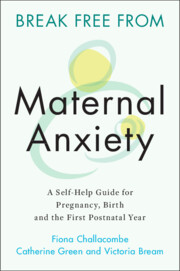 Break Free from Maternal Anxiety
Break Free from Maternal Anxiety Book contents
- Reviews
- Break Free from Maternal Anxiety
- Break Free from Maternal Anxiety
- Copyright page
- Dedication
- Contents
- About the Authors
- How to Use This Book
- Acknowledgements
- 1 Introduction
- 2 Persistent and Distressing Worry
- 3 Unwanted Intrusive Thoughts of Harm (Obsessive Compulsive Disorder)
- 4 Specific Phobias Affecting Pregnancy and the Postnatal Period
- 5 Panic Attacks and Health Worries
- 6 Feeling Anxious Around Other People
- 7 Coping with Traumatic Experiences While Pregnant and After Birth
- 8 Anxiety About Pregnancy and Birth
- 9 Anxiety and Adjusting to Motherhood
- 10 Beyond the Perinatal Period: Taking Your New Skills Forward into Parenthood
- Appendices
- References and Resources
- Selected Resources (A Complete List Can Be Found Online)
- Index
7 - Coping with Traumatic Experiences While Pregnant and After Birth
Published online by Cambridge University Press: 13 October 2022
- Reviews
- Break Free from Maternal Anxiety
- Break Free from Maternal Anxiety
- Copyright page
- Dedication
- Contents
- About the Authors
- How to Use This Book
- Acknowledgements
- 1 Introduction
- 2 Persistent and Distressing Worry
- 3 Unwanted Intrusive Thoughts of Harm (Obsessive Compulsive Disorder)
- 4 Specific Phobias Affecting Pregnancy and the Postnatal Period
- 5 Panic Attacks and Health Worries
- 6 Feeling Anxious Around Other People
- 7 Coping with Traumatic Experiences While Pregnant and After Birth
- 8 Anxiety About Pregnancy and Birth
- 9 Anxiety and Adjusting to Motherhood
- 10 Beyond the Perinatal Period: Taking Your New Skills Forward into Parenthood
- Appendices
- References and Resources
- Selected Resources (A Complete List Can Be Found Online)
- Index
Summary
This chapter provides an understanding of the ways that past trauma can affect women in pregnancy and postnatally. It provides guidance on how to recognise and understand the symptoms of post traumatic stress and information on why a traumatic event can continue to affect a person deeply, even if it was a long time ago, other circumstances have moved on or it is not considered ‘traumatic’ by others. The focus is on maternity and birth-related traumas, although the principles apply to other types of trauma. Evidence-based techniques will help you understand and work through your reactions to trauma and will help you put intrusive memories into the past so that you can untangle the past and present. This chapter covers working with self-blame and tackling other consequences of trauma such as feelings of disconnection as well as practical tips on talking to loved ones and professionals in order to get the right support at this time.
- Type
- Chapter
- Information
- Break Free from Maternal AnxietyA Self-Help Guide for Pregnancy, Birth and the First Postnatal Year, pp. 178 - 255Publisher: Cambridge University PressPrint publication year: 2022
